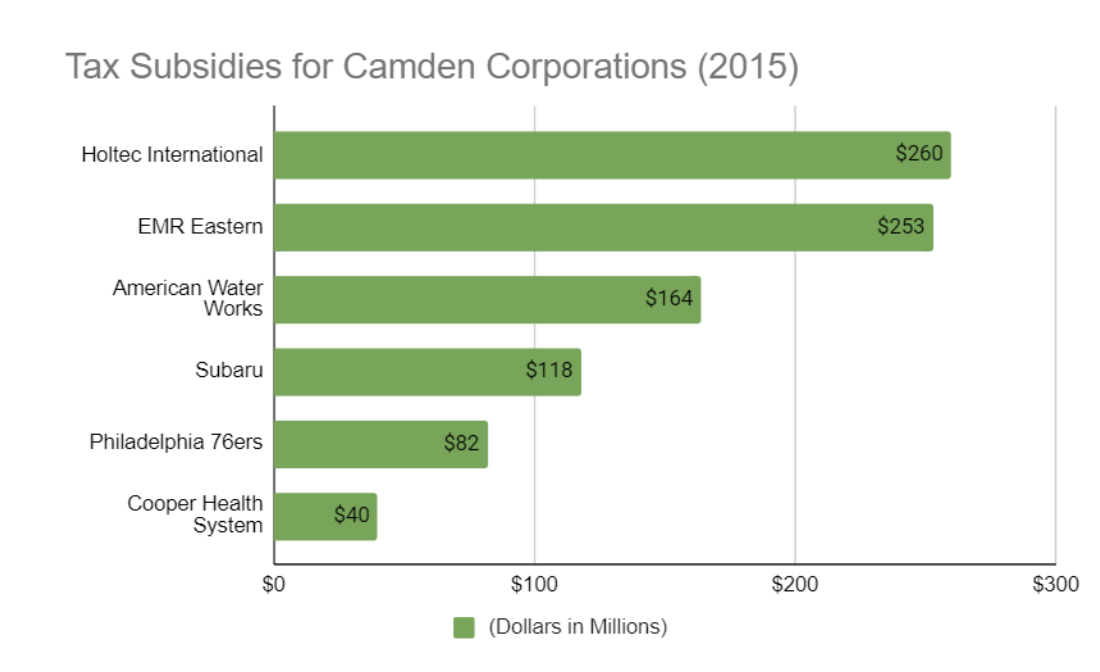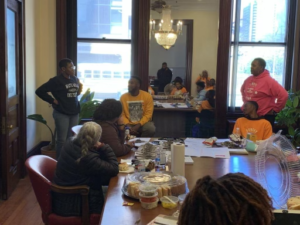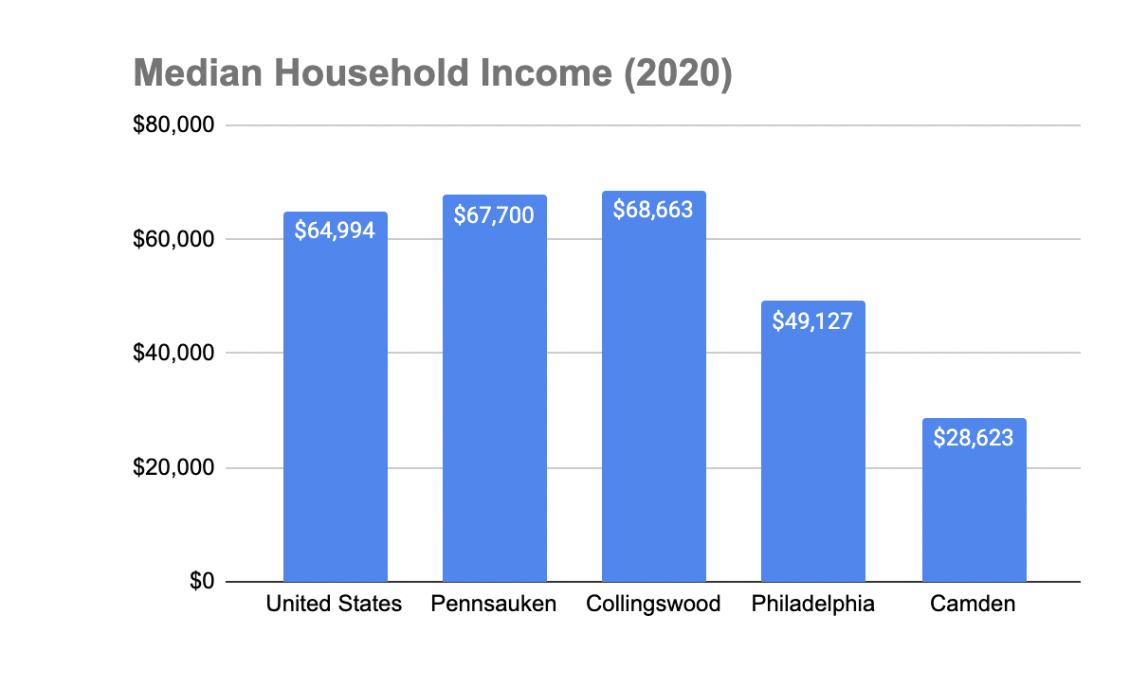
 CAMDEN — A typical week day for Ursahia Turner-Williams, a 46-year-old, starts with a shower, then a seat at her desk, before readying herself for work.
CAMDEN — A typical week day for Ursahia Turner-Williams, a 46-year-old, starts with a shower, then a seat at her desk, before readying herself for work.
Williams, a lifelong Camden resident, has worked as a patient service representative at CAMcare, which also operates in Gloucester county, for two years.
“I’m a single person with no kids. I make $18.85 per hour and can’t afford to pay my bills and still feed myself properly,” Williams said.
Locally, Williams said her options for gainful employment are few and far between.
“Houses are under code. There’s no jobs in the city,” Turner said. “Yet rent is $1,500 a month for a three bedroom and we’re still expected to pay utilities. There’s no rent control. They’re always building up the waterfront and breaking ground, but there’s never any jobs! How are we supposed to make it?”
The grassroots coalition, “Camden We Choose,” wants to change that for residents, like Turner, who are seeking opportunities and employment in the city.
And the coalition claimed victory after the passage of an ordinance on September 7, 2022. It will require all Camden-based businesses that employ 25 or more people to disclose the number of residents they hire as well as their earnings.
“Camden We Choose” is a coalition of grassroots organizations and nonprofits with the belief that transparency in the hiring process will lead to more equitable and favorable outcomes for Camden residents.
It all started in 2018 when “Camden We Choose” was initially formed. The Unity Community Center of South Jersey, CWA Local 1014, the Camden Education Association, the Camden Parents Union, Community Doulas of South Jersey, Watu Moja, and the Camden County NAACP were among the organizations involved in its creation.
Since its inception, the coalition has worked to empower residents. In 2018, they advocated for local voters to have the right to elect their own school board, rather than it being appointed.
 In 2019, after an audit by the state comptroller revealed that company tax breaks lacked oversight, Governor Murphy initiated the Task Force on the Economic Development Authority’s Tax Incentives.
In 2019, after an audit by the state comptroller revealed that company tax breaks lacked oversight, Governor Murphy initiated the Task Force on the Economic Development Authority’s Tax Incentives.
Black In Jersey reached out to the Governor for a comment, but didn’t receive an answer.
“Camden has been ground zero for this experiment in corporate subsidies for a long time. And it really hasn’t worked out for the city, for the state, for anybody,” Pat Garofalo, Director of State and Local Policy at the American Economic Liberties Project, said.
Since the development of the Task Force, the EDA has been prompted to change its oversight practices. In January 2022, the Courier-Post reported that the EDA reduced tax breaks awarded to 82 firms by almost $350 million.
Camden businesses’ tax incentives were reduced significantly in the wake of the task force. Waterfront apartment complex — CP Residential GSGZ LLC — saw its incentives cut by $3 million. Eastern Metal Recycling saw a more significant decrease in tax breaks from $252.7 million to $131.6 million.
“Camden Rising” is making sure that the people thrive, not just the waterfront. Camden has to rise all over!”’ Ronsha Dickerson, an activist and co-chair of the coalition, said.
Dickerson is referring to the commonly used “Camden Rising” slogan, which is also the name of an initiative set forth by the city. The initiative and slogan highlights the increasing urban development, mass transportation and corporate partnerships in the city, intended to improve the quality of life for residents.
Despite numerous corporate tax breaks, the U.S. Census Bureau reported that, as of 2020, Camden’s poverty rate is at 33.6% with a median household income of $28,623. The national median household income that same year was $67,521.
The passage of the ordinance, led by “Camden We Choose,” has done much to ignite residents with hope for substantial change in the city.

Silvia Mincey, a 43-year-old Camden resident, echoes Turner’s sentiments. Mincey works in the city as a caregiver.
“I don’t think it’s right that the businesses get all of this money and we don’t know what happens with it. So I think this is a good thing…they can keep count on making sure the businesses help the people,” Mincey said.
The ordinance passed as a direct result of the “Camden We Chose” coalition’s persistence. Initially, the measure was presented as a petition, and it needed at least 745 signatures
Watu Moja, a Camden nonprofit, is a part of the coalition. The nonprofit utilized the Camden FireWorks art gallery as its base to organize residents. Here, residents were provided with a model for canvassing and collecting signatures to support the petition.
In preparation for their duties, 60 canvassers were trained by Watu Moja’s board president Ayinde Merrill and secretary Camille Wilson. Canvassers were paid for their services as well as trained in tactics for de-escalation and civic engagement.
“Smart governments rely on data. Without data you cannot make solid and sound policy,” Merrill said.
Canvassers endured the summer heat and engaged the community in a coordinated effort. They were bused to various parts of the city to collect signatures and inform residents of the referendum.
Merrill reflects on his experiences with residents over the summer.
“Camden has so many people and factions. Some people in politics thought that we didn’t need the data,” Merrill said. “That it was unnecessary. Some people thought it wouldn’t change. But what I noticed is that those who were excited about the petition far outweighed the other groups.”

The coalition then delivered the signatures to Camden City Hall.
“Government and elected officials have a way of disenfranchising the residents of the city. When it came to verifying the signatures, the city moved the goal post.” Isaiah Carr, a 21-year-old Camden County College student, majoring in Information Systems, said.
Carr vocalized the frustration and the challenge that came with getting the signatures validated by the city clerk, Luis Pastoriza, who initially rejected the petition in June.
The petition was rejected because less than half of the 1,232 signatures collected were considered valid. Unfortunately, for the activists, only signatures from “qualified voters” were counted. A “qualified voter,” as defined by the city clerk, is a Camden resident who has voted in the last two election cycles.
“The city was deliberate with this. It only improves itself for the benefit of the corporate investors rather than for the welfare of the people, ” Carr lamented.
Undeterred by the response of the city clerk, Dickerson and the coalition used a 10-day cure period to submit nearly 900 additional signatures.
“The battle is to get what we prioritize,” Dickerson, who is the chairman of the coalition, stated.
The result of overwhelming support from residents allowed the issue to be voted on by the city council. If rejected by the council, residents would have the chance to vote on the referendum directly in the November midterm election.
However, after a vote by the council, the referendum began the process of approval. Mayor Victor Carstophen even signed a letter of support.
“Unemployment was at 22% in July 2020. Today it is at 6.8%. This is a result of local hiring practices to connect our residents with employment through job fairs,” Mayor Carstophen, addressing city residents during a community meeting at Pyne Point School on October 19, said.
The NJ Department of Community Affairs had 28 days to approve the referendum once supported by Mayor Carstophen. DCA approved the referendum on September 7.
“By way of us being the ‘squeaky wheel,’ we’ve been able to show the power of the people.” Dickerson passionately remarked.
The ordinance has seen one notable change since its inception. It’ll now include governmental and educational entities. This means entities, such as Rutgers University-Camden, are now expected to make transparent how many residents they hire and their income.
“This ordinance tells businesses in Camden that we want to have a good economic relationship with them,” Dickerson said.
The ordinance will take effect immediately with semi-annual reports from local businesses that hire 25 or more residents. The first report is expected on February 1, 2023, and the following report in August of the same year.
“This is an amazing opportunity to find out where residents are working and more importantly, finding out who isn’t working and why.” Merrill, Watu Moja’s board president, commented on the success of the ordinance.
The city clerk and attorney are charged with the oversight of the ordinance, and the new measure will be at no additional cost to taxpayers.
“Camden Business Association and the nonprofit Latin American Economic Development Association (LAEDA) are assembling a database of small businesses and establishing the capacity of small businesses to link up the hiring needs. We want to link up the hiring needs of companies to connect employers and employees,” City Business Administrator, Timothy J. Cunningham, said.
The city plans to create a new page on its website and distribute fliers and applications to inform impacted businesses about the ordinance.
“Opportunities are there and I know they are there, because I am holding their feet to the fire!” Mayor Carstophen said.
Since claiming victory with the ordinance, the coalition has done anything but slow down.
“They did great work. They picked the right thing. Folks there know the history. The community knows that they’ve been on the wrong end of these corporate subsidies for a long time,” Garofalo of the American Economic Liberties Project said. “And so…kudos to them. I really hope it’s a model for other cities in the (United) States to pick up and run with.”
The coalition organized canvassers to register residents to vote in this year’s election, which saw high turnout in many places across the country. The goal being to target individuals who offered a signature, but weren’t in the voter database.
“We are giving them a way of having hope, a vision and template for change,” Dickerson, coalition chairman, said.

Written by Charles Curtis, III
Editing and graphics by Harrison Malkin and Tennyson Donyea
Data from U.S. Census Bureau and NJ Spotlight News
